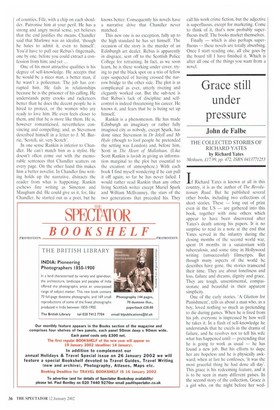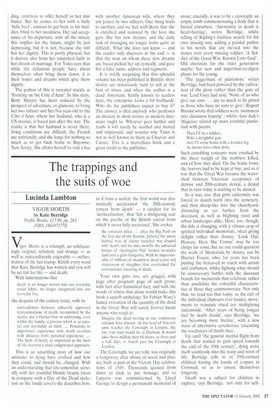Grace still under pressure
John de Falbe
THE COLLECTED STORIES OF RICHARD YATES by Richard Yates Methuen, £17.99, pp. 472, ISBN 0413771253 If Richard Yates is known at all in this country, it is as the author of The Revolutionary Road. But he published several other books, including two collections of short stories. These — long out of print even in the US — are gathered into this book, together with nine others which appear to have been discovered after Yates's death among his papers. It is no surprise to read in a note at the end that Yates served in the infantry during the closing months of the second world war, spent 18 months in a sanatorium with tuberculosis, and some time in Hollywood writing (unsuccessful) filmscripts. But though many aspects of the world he describes have gone, the stories transcend their time. They are about loneliness and loss, failure and dreams, dignity and grace. They are tough, unsentimental, compassionate and beautiful in their apparent simplicity.
One of the early stories, 'A Glutton for Punishment', tells us about a man who, as a boy, loved nothing so much as pretending to die during games. When he is fired from his job, everyone is impressed by how well he takes it. In a flash of self-knowledge he understands that he excels in the drama of failure, and he resolves not to tell his wife what has happened until — pretending that he is going to work as usual — he has found a new job. But his efforts to dupe her are hopeless and he is physically awkward; when at last he confesses, 'it was the most graceful thing he had done all day'. This grace is his redeeming feature, and it is to be seen in many different guises. In the second story of the collection, Grace is a girl who, on the night before her wed
ding, contrives to offer herself to her dim fiancé. But he comes to her with a belly lulla beer', anxious to get back to his buddies, blind to her neediness. Her sad acceptance of his departure, with all the misery this implies for the future, might be just depressing, but it is not, because she still has her dignity. This is partly physical, but it derives also from her unspoken faith in her dream of marriage. For Yates sees that while the delusions people have about themselves often bring them down, it is their hopes and dreams which give them dignity.
The pathos of this is revealed starkly in 'Evening on the Cote d'Azur'. In this story, Betty Meyers has been seduced by the prospect of adventure, or glamour, to bring her two infants and her five-year-old to the Cote d'Azur, where her husband, who is a US marine, is based just after the war. The reality is that her husband is never there, living conditions are difficult, the French are unfriendly, and she longs for nothing so much as to get back home to Bayonne, New Jersey. She allows herself to visit a bar with another American wife, where they are joined by two officers. One thing leads to another, and we feel with Betty that she is enriched and restored by the love she gets. She has new dreams, and the daily task of managing no longer looks quite so difficult. What she does not know — and the reader only discovers at the end — is that the man on whom these new dreams are based picked her up cynically, and gave her a false name, address and regiment.
It is mildly surprising that this splendid volume has been published in Britain: short stories are notoriously hard to sell at the best of times, and when the author is a dead American, hardly known to readers here, the enterprise looks a bit foolhardy. Who do the publishers expect to buy it? The answer is that anybody who professes an interest in short stories or modern literature ought to. Whoever goes further and reads it will surely be startled and moved and impressed, and wonder why Yates is not as well known to them as Cheever and Carver. This is a marvellous book and a great credit to the publisher.



























































 Previous page
Previous page